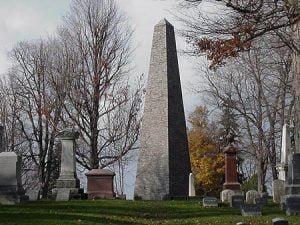We now come to a war in which one of the most celebrated of Indian chiefs bore the most prominent part. Logan was a Mingo chief, whose father, Shikellinus, was a chief of the Cayugas. He derived his name from the attachment which had existed between the benevolent James Logan and his father. In true greatness of soul few have surpassed Logan, and his misfortunes have excited much sympathy among all capable of appreciating them on him.
In the spring of 1774, a party of Indians robbed some whites who were preparing to settle upon the banks of the Ohio. The whites, considering this an indication of hostile intentions, assembled at a place on Wheeling creek. Captain Michael Cresap, at the head of the party, proceeded to attack a party of Indians on the Ohio River, and, by professing friendly intentions, completely surprised them. Several were slain; and among them were some of the family of Logan. Soon after this affair, another party of these borderers, with Daniel Greathouse at their head, attacked a company of Indians about thirty miles above Wheeling. Many of them were murdered, under circumstances which aggravated the crime. A brother and sister of Logan were among the victims. (May 24th, 1674.) Logan returning from a hunting excursion to his home, finding the remains of his murdered relatives, vowed revenge. The consequence was a war, in which little mercy was shown upon either side.

The Shawanese, Delawares, and many other tribes were united for the contest. Cornstalk was the great commander upon the side of the Indians; but Logan and Red Eagle displayed their bravery in an equal manner. On the 12th of July, Logan, at the head of only eight warriors, attacked some settlers upon the Muskingum, killed one man, and captured two others, one whom afterwards became his secretary. When the news of the Indian depredations reached the seat of government of Virginia, Governor Dunmore immediately ordered out the militia, to the number of three thousand men, half of whom, under Colonel Andrew Lewis, marched toward the mouth of the Great Kanhawa, while the governor himself with the remainder, marched against the Indian towns on the Ohio.
The division under Colonel Lewis, met with no opposition until it arrived at Point Pleasant on the Great Kanhawa, where about fifteen hundred Indians under the chief command of Cornstalk were drawn up for battle. A detachment of three hundred men first fell in with them, and was defeated with great slaughter; but the other divisions coming up, the conflict became obstinate and bloody, and was maintained during the whole day. As night closed upon the battle, the Indians slowly retreated, without being pursued. There is much difference in the statements of the loss of the English and Indians in this well fought battle. From the Indian custom of carrying off the dead, it is impossible to give an accurate account of their killed and wounded. Thirty-three bodies were found upon the field. The loss of the English is stated to have been fifty-five killed and eighty-seven wounded.
After the battle, the English force encamped on a plain eight miles from Chilicothe, a place appointed for meeting the chiefs in order to negotiate a peace. Three days after, Cornstalk and eight other chiefs, came to the encampment, and in the conference which ensued, both parties charged each other with breach of treaties and injuries committed by their respective country-men. At length a treaty was concluded. Logan would not meet the whites in council, although he desired peace. He remained in his cabin in sullen silence, until a messenger was sent to him, to know whether he would accede to the proposals. It was then he delivered his famous speech, which was in substance as follows:
“I appeal to any white man to say, if ever he entered Logan’s cabin hungry, and he gave him not meat; if ever he came cold and naked and he clothed him not.
“During the course of the last long bloody war, Logan remained idle in his cabin, an advocate for peace. Such was my love for the whites that my countrymen pointed as they passed, and said, ‘Logan is the friend of white men.’
“I had even thought to have lived with you, but for the injuries of one man. Colonel Cresap, the last spring, in cold blood, and unprovoked, murdered all the relations of Logan; not even sparing my women and children.
“There runs not a drop of my blood in the veins of any living creature. This called on me for revenge. I have sought it. I have killed many. I have fully glutted my vengeance. For my country, I rejoice at the beams of peace. But do not harbor a thought that mine is the joy of fear. Logan never felt fear. He will not turn on his heel to save his life. Who is there to mourn for Logan? Not one!”
Not long after the conclusion of the treaty, Logan was cruelly murdered as he was on his way home from Detroit. His greatness was obscured previous to his death by the habits of constant intoxication which he had contracted perhaps, says the voice of sympathy, to “drown his sorrow.” Cornstalk, his great compatriot, with his valiant son, Ellinipuis, met the same fate, while on a mission of peace to Point Pleasant, in 1777. To which shall the term “savages” be applied?
